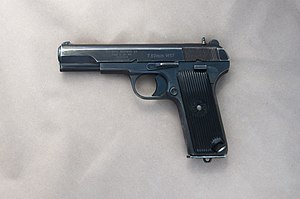| Zastava M57 | |
|---|---|
 The M57 with a loaded 9-round magazine. | |
| Type | Semi-automatic pistol |
| Place of origin | Yugoslavia |
| Service history | |
| In service | 1961–1992 (Yugoslavia) |
| Used by | Yugoslav People's Army |
| Wars |
Vietnam War Persian Gulf War Internal resistance to apartheid [1] Yugoslav Wars Russian invasion of Ukraine [2] |
| Production history | |
| Designer | Zastava Arms |
| Designed | 1957 [3] |
| Manufacturer | Zastava Arms |
| Produced | 1963–1982 [4] |
| No. built | 260,000–270,000 [4] |
| Variants | See Variants |
| Specifications | |
| Mass | 854 g (30.1 oz) |
| Length | 194 mm (7.6 in) |
| Barrel length | 116 mm (4.6 in) |
| Height | 134 mm (5.3 in) |
| Cartridge | 7.62×25mm Tokarev |
| Action | Short recoil actuated, locked breech, single action |
| Muzzle velocity | 480 m/s (1,575 ft/s) |
| Effective firing range | 50 m |
| Feed system | 9-round detachable box magazine |
| Sights | Front blade, rear notch 156 mm (6.1 in) sight radius |
The Zastava M57 is a Yugoslavian and Serbian semi-automatic pistol produced by Zastava Arms. It was the standard service pistol of the Yugoslav People's Army from 1961 until the early 1990s. [3] The M57 was an unlicensed derivative of the Soviet TT pistol, but incorporated a number of detail modifications, namely a longer grip and a slightly larger magazine. [2] Zastava reverse engineered the Soviet TT in 1954, and began serial production of the weapon type as the M57 in 1963. [3]
As of 2021, Zastava still produced modernized variants of the M57 with updated safety features - the M57A in its original chambering and the M70A in 9mm Parabellum. [5]
History
Designed in the mid-1950s, the M57 was an unlicensed copy of the Soviet TT-33 Tokarev. [3] The Yugoslav People's Army had initially attempted to adopt the TT as its standard service pistol after World War II, and a number were delivered by the Soviet Union. [3] However, the Tito–Stalin split prompted the Soviet government to cease military aid to Yugoslavia before deliveries of the pistol were fully completed. [3] In 1952, Zastava was charged with developing its own variant of the TT to satisfy the army's needs. [4] Zastava's engineers were able to reverse engineer the weapon by 1954. [3] However, its factory was already at capacity manufacturing rifles and submachine guns, and it was unable to open a new production line to produce the TT. [4] The project was shelved until 1956, when army officials again expressed interest in the TT design. [3] Work on an improved TT derivative began in earnest in 1957, and the first prototypes appeared in 1960. [3] The Zastava pistol was formally designated M57 and accepted for service in 1961. [3] Although the army took delivery of various pre-production models that year, serial production was delayed until 1963. [3]
Zastava manufactured the M57 from 1963 until 1982, at which time at least 260,000 had been produced. [4] It was retired from military service in the former Yugoslavia during the late 1990s and early 2000s, being largely superseded by the Zastava CZ99. [3]
Design details
In 1954, Zastava initially unveiled a handgun that was an identical copy of the original TT-33. [4] However, between 1957 and 1960, a number of modifications to the Soviet design were made. [3] The most noticeable difference is that the M57 was designed with a larger magazine that has a capacity of nine rounds as opposed to the TT-33's eight. [4] The M57 was also fitted with a magazine safety, reducing the likelihood of an accidental discharge while the magazine is being removed. [4] Zastava engineers added a dovetailed front sight that may be adjusted for windage, and the top of the weapon's slide is serrated to reduce glare. [4] There were a few minor internal changes as well, including a unique Zastava firing pin and a captive recoil spring to simplify disassembly. [4]
Variants
- M57: Standard military version. [5]
- M57A: Commercial production model of the M57, with an added external slide safety. [5]
- M70A: Export variant of the M57 chambered for 9×19mm Parabellum and introduced in 1970. [5]
- M70AA: Commercial production model of the M70A, with an added external slide safety. [5]
Users
Former users
 Inkatha Freedom Party
[1]
Inkatha Freedom Party
[1] Yugoslavia
[3]
Yugoslavia
[3] Serbia: Retired in the 2000s.
[3]
Serbia: Retired in the 2000s.
[3]
See also
Notes and references
- ^ a b Luthuli, Daluxolo; Bopela, Thula (2005). Umkhonto We Siswe: Fighting for a Divided People. Alberton: Galago Publishing Company. pp. 60, 113. ISBN 978-1919854168.
- ^ a b c "Vintage Weapons In a Modern War: The TT-33 Pistol In Ukraine". The Armourer's Bench. Beaverton. 26 March 2023. Archived from the original on 19 October 2023. Retrieved 16 December 2023.
- ^ a b c d e f g h i j k l m n o Sof, Eric (7 January 2023). "Zastava M57: The Yugoslavian-Made Clone of the Legendary Soviet TT-33 Pistol". Spec Ops Magazine. Dover. Archived from the original on 5 February 2023. Retrieved 16 December 2023.
- ^ a b c d e f g h i j k Thompson, Leroy (2022). Soviet Pistols: Tokarev, Makarov, Stechkin and others. Oxford: Osprey Publishing. pp. 65–67. ISBN 978-1472853486.
- ^ a b c d e Borisenko, Adam (28 May 2021). "Zastava M57 and M70A: The Yugoslavian Tokarevs". The Gun Digest. Appleton, Wisconsin. Archived from the original on 31 May 2023. Retrieved 14 May 2024.